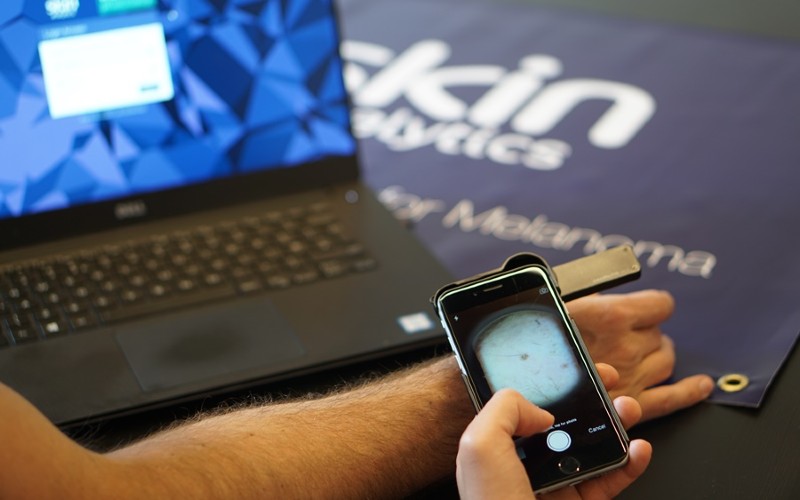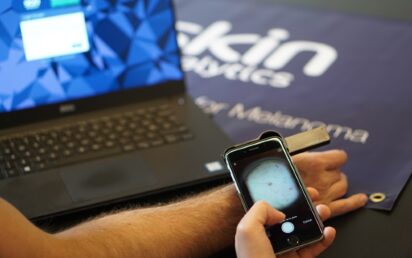Thousands of patients and NHS staff will benefit from dozens of new pioneering projects awarded a share of £36 million to test state-of-the-art AI technology.
The projects will help the NHS to transform the quality of care and the speed of diagnoses for conditions such as lung cancer.
Health and Social Care Secretary Matt Hancock announced the winners of the second wave of the NHS AI Lab’s AI in Health and Care Award.
The projects backed by NHSX and Accelerated Access Collaborative (AAC) include an AI-guided tool to help doctors and nurses to diagnose heart attacks more accurately; an algorithm to fast-track the detection of lung cancer; an AI-powered mental health app to help tackle symptoms of anxiety and depression while also identifying people experiencing severe mental health difficulties; and tech to help spot undiagnosed spinal fractures.
The full list of projects are:
Bone Health Solutions
Zebra Medical Vision
A pilot project using AI to analyse any type of scan to catch undiagnosed spinal fractures, which can be a marker for osteoporosis. Patients will receive lifestyle advice, where appropriate, to reduce future fracture risks associated with the disease.
Paige prostate cancer detection tool
University of Oxford
Using AI to support the analysis of pathology samples and images in order to more efficiently detect and quantify cancer in biopsies, diagnosing prostate and other cancers. This addresses a rise in caseload combined with a drop in qualified pathologists, which has led to backlogs in the system.
Chest X-ray analysis
Behold.AI Technologies Ltd
Real-world testing of an AI algorithm to fast-track the diagnosis of suspected lung cancer patients, offering them same-day CT scans. Patients whose chest X-rays show no abnormalities will be flagged, and spared further procedures.
eHub
eConsult Health Ltd
Using AI to intelligently triage and automate GP e-consultation requests, reducing staff time to manage the system. eHub aims to improve clinician efficiency, and allow easier interface for GPs and admin staff with eConsult software, reducing errors and improving patient safety.
DERM
Skin Analytics Ltd
Expanding trials of the use of AI in the analysis of images of skin lesions, distinguishing between cancerous, pre-cancerous and benign lesions. DERM sets out to highlight the most likely cancers and aid in swift and appropriate treatment being offered, reducing backlogs in this service and reducing premature deaths.
CaRi-HEART
Caristo Diagnostics Ltd
Using AI to detect the invisible signatures of inflammation in the heart as shown in regular CT scans. This gives a better prediction of the risk of cardiovascular disease, allowing more efficient targeting of medication and treatment.
Cogstack Natural Language Processing
King’s College London
This AI-based clinical coding of medical records aims to enable more efficient analysis, remove errors, free up staff time, and improve research. Recruitment for clinical trials will be improved, and individual clinicians will be able to analyse patient records more efficiently.
qER
Qure.ai Technologies Private Limited
Evaluation of the use of AI to support emergency department clinicians to analyse CT scans in patients with head injuries, leading to faster treatments and better outcomes for the patients. This can be vital in areas where there is a shortage of trained radiologists to analyse the scan images immediately.
ArtiQ.Spiro
Guy’s and St Thomas’ NHS Foundation Trust
Testing the use of AI to interpret and evaluate the spirometry test used to determine lung function, freeing up clinician time, and reducing incorrect diagnoses. Part of the NHS’s Long Term Plan to combat lung disease, and reduce health inequality.
Workforce deployment solutions
Navenio Limited
Using AI to implement workforce solutions, ensuring that both clinical and support staff are in the right place at the right time within a hospital, to maximise efficiency. The programme uses smartphones for the deployment of porters, cleaners, Allied Health Professionals and others, when they are needed.
Analysing breast screening X-rays
Imperial College London
Evaluating the potential of AI for analysing X-ray images of routine mammograms (breast screening). This will improve accuracy, safety, cost-effectiveness and patient experience, giving results faster, and helping mitigate the shortage of radiographers available to analyse mammograms.
InnerEye
Cambridge University Hospitals NHS Foundation Trust
Using open-source AI and machine learning to differentiate tumour and healthy tissue on cancer scans (called ‘segmenting’), prior to radiotherapy treatment. This saves clinicians’ time, and reduces the time between the scan and commencing treatment.
DOLCE
Optellum Ltd
Determining the impact on healthcare services of Optellum’s Lung Cancer Prediction artificial intelligence solution DOLCE, which examines lung nodules to determine which are precancerous, without the use of expensive tests and scans, minimising worrying delays for the patient.
Lenus COPD Management Service
Storm ID Ltd
Introducing prevention and self-management to people with COPD lung disorder, using AI to analyse output from patients’ daily monitoring and wearable devices. This is used to predict the worsening of COPD, enabling clinicians to prioritise patients who are most at risk.
Wysa
WYSA Ltd
Real-world testing of an AI app as an early intervention and support tool for mental health, to be used by patients on the waiting list for regular care. The aim is to reduce symptoms of anxiety and depression, and detect people experiencing severe mental health difficulties, so that they can be prioritised for treatment.
MyDiabetes IQ
MyWay Digital Health Ltd
MyWay Digital health is testing an AI tool for predicting diabetes complications and treatment choices, to support non-specialist GPs with managing their diabetes patients. The aim is to prevent complications, like heart attacks and foot ulcers.
BloodTyper
University of Cambridge
BloodTyper is an AI system that uses DNA to determine the sub-groups of donated blood, improving how well blood is matched to recipients. This reduces the risk of rejection, and will enable systems to be developed that use blood stocks more efficiently, and even target blood donation appeals for the most-needed blood sub-groups.
Advance notice of deterioration in cystic fibrosis
University of Cambridge / Royal Papworth Hospital NHS Foundation Trust
This project is using AI with home monitoring equipment to predict sudden dips in the health of cystic fibrosis patients, aiming to prevent them occurring, and support clinicians and patients to make good decisions without repeated hospital check-ups.
mySmartCOPD
University of Southampton
Patients with Chronic Obstructive Pulmonary Disease (COPD) are being supported to use home monitoring of various health markers, and report them using the MyCOPD app. The data are analysed by AI to predict ‘exacerbation events’, where a patient’s condition suddenly declines, in order to prevent or lessen these events.
ImageDx
Sonrai Analytics Ltd
A centralised, AI-based solution for faster and more accurate testing on cancer biopsy tissue for colorectal, lung and other cancers.
First PLUS
Perspectum Ltd
The First PLUS project uses AI to analyse the size of the placenta during the first trimester, and flag those that are abnormally small, which is an indicator for Fetal Growth Restriction. This is a risk factor for stillbirth and other neonatal conditions, as well as lifelong health issues.
CHRONOS
University of Oxford
The CHRONOS project is developing AI and natural language processing capability, to extract relevant information from patients’ health records, going back in time. This will help clinicians triage patients who are referred to mental health services, enabling swifter care, and to flag high-risk patients.
CESCAIL
Corporate Health International UK Ltd
The CESCAIL project is testing how effective AI can be in performing preliminary analysis on the hours of images taken during capsule endoscopy, saving clinicians up to 80% of the time they would usually spend on this work. The project will allow this more flexible type of endoscopy to be rolled out further in the community.
Eye2Gene
University College London, Moorfields Ophthalmic Reading Centre
Eye2Gene is exploring the use of AI to determine which genetic condition is causing a patient’s inherited retinal disease, by examining eye scans. With more than 180 possible genetic causes, requiring differing management or treatment options, swift diagnosis is crucial.
Issues and themes analysis in complaints
Methods Analytics Ltd
This project aims to use AI and Natural Language Processing to improve the speed, responsiveness and learning from the management of healthcare complaints, picking up key issues in individual cases, and recurring patterns across a service or area.
Machine learning to improve the diagnosis of heart attacks
University of Edinburgh
This project is developing an AI-guided tool to help doctors and nurses interpret a patient’s troponin levels to diagnose heart attacks more accurately. A web app can be used on a mobile device at the bedside or embedded into hospital computer systems.
Monitoring slow-growing brain tumours
University of Cambridge
Certain types of brain tumour are deemed low-risk, as they grow so slowly. This project aims to develop AI to measure the volume of tumours from scans, and learn which are at risk of growth, to ensure those patients are monitored more frequently, and others can be reassured that their tumour is lower risk.
Pathpoint Detect
Open Medical Ltd
Pathpoint Detect is a new development for existing Pathpoint patient care workflow software, enabling it to offer decision-support tools for dermatology clinicians, based on imaging from prior cases, and previous consultant decisions.
Developing the Blood Pressure Index for improved blood pressure control
Imperial College London
Developing the Blood Pressure Index, to provide more data for patients monitoring their blood pressure, with the help of AI to monitor hypertension, the most important cause of strokes, heart disease and death.
panPIERS
King’s College London
This project plans to combine the existing PIERS (Pre-eclampsia Integrated Estimate of Risk Score) tools, miniPIERS and fullPIERS, together with AI into an app to calculate an individual woman’s risk of pre-eclampsia, and its potential severity, including post-birth complications.
PREVAIL – PhototheRapy Enhanced Via Artificially Intelligent Lasers
University of Southampton
The PREVAIL project is developing automatic ‘self-driving’ UVB lasers for the treatment of psoriasis, enabling only the affected skin to be targeted in high doses. This would reduce the risk of skin cancer in adjacent skin caused by the blanket use of UVB rays, and remove the need for a specialist clinician to target affected areas by hand.
Measuring hip dysplasia in children with cerebral palsy
University of Manchester
This project seeks to use machine learning to assess X-ray images of the hips of children with cerebral palsy, to determine whether they are at risk of hip dislocation, a process which can be time-consuming when carried out by clinicians.
CirrhoCare
Cyberliver Ltd
CyberLiver proposes using AI to examine the outcomes for patients with cirrhosis who experience deteriorations in their condition due to infection, to better understand which will benefit from early ICU care.
Decision-making for less-than-perfect kidney transplant matches
University of Oxford
Deceased kidney donors and potential recipients are not always perfectly matched, so this project aims to train AI to help with the decision-making process around whether clinicians should accept less-than-perfectly-matched donor kidneys, or whether to wait for a better match, by analysing the likely patient outcome in both cases.
Detecting coronary artery calcification in chest X-rays
Golden Jubilee National Hospital and University of Glasgow
Many CT scans include the heart, even if it is not the primary focus of the image. This project aims to train AI in the detection of coronary artery calcification, so that early care and treatment can be provided in advance of the patient reporting heart problems.
Predicting and monitoring pre-term labour
Coventry University
This project will explore the use of electrohysterography sensing to predict and monitor the pre-term labour of women giving birth before 37 weeks, using AI to provide more accurate data than is currently available by this or other methods.
R-CANCER
Imperial College London
R-CANCER will improve the quality of decisions made by doctors when deciding how best to detect and diagnose cancer, by intelligently collating, analysing and interpreting new data on cancer from academic and open data sources.
Diagnosis of ‘glue ear’ with AI
Cardiff Metropolitan University
This project aims to test the use of AI to accurately diagnose ‘glue ear’ (Otitis Media with Effusion) in children, preventing delayed or incorrect diagnoses, and reducing complications and recurrent issues.


